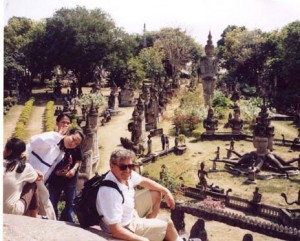
Peter Montalbano is an American Bangkok-based writer, musician and linguist, member of the Bangkok Writers’ Guild. In this interview, Peter talks about his novel project, The Lover with a Thousand Faces, the Bangkok music scene, and his love for languages.
MVS: On the front page of your website you say that “Right now I’m pretty obsessed with mastering the Thai language.” How fluent are you in Thai?
PM: On some levels I’m very facile. On others, pretty clumsy. I’ve been studying off and on at the advanced level of the intensive Thai course at Chulalongkorn University, and after another two 5-week modules will have completed their series. I read and write Thai, and believe that’s a prerequisite for calling yourself fluent. But I have a hard time using that word to describe myself, I haven’t reached my own standards for that yet. (By the way, that website is wayyyy out-of-date, haven’t updated it for about 5 years, so if you visit, please be aware of that!)
MVS: As a linguist who, apart from your native tongue, can speak several languages, what’s so special about Thai?
PM: I speak good German and not-so-good French (though I read French well enough), and I at one time had enough command of Latin to write critical papers on Ovid and Virgil. Those languages were not so hard to learn: within a few years of study, including a summer at the Sorbonne and a year in Switzerland, I had them pretty much under control. But Thai is another world, and it’s taking much longer to master than I ever thought it would. I think that the very things that charm me about it are the things that make it difficult. High among those would be its tonal nature, the lack of English cognates, and the deceptively simple grammar. Oh, and the beautiful but arcane writing system. There’s an old proverb which goes something like “Learning another language is like getting another soul.” That’s what it feels like, being slowly reborn into a second life with a completely different way of thinking.
MVS: In a recent interview, Trirat Petchsingh, a Thai writer who writes exclusively in English, said that there’s “plenty” wrong with the Thai language. Please comment.
PM: Well, Trirat is right that there are at least some things wrong with it. What I heard him say when we talked about it is that there are no Thai words which can adequately express some of the complex concepts of the modern world. To a large extent that’s true, and the Thais have, to my mind, overcompensated by importing a huge number of mostly English words—albeit with weird pronunciations!—into their own language. Some of the hardest Thai words to read are these imported words, which aren’t Thai at all. Some of these imports could have, and I think should have, been avoided, but many were necessary. That said, I am extremely impressed with the richness of this language. Take a pre-Han southern Chinese dialect, mix in a third part elegant Sanskrit/Pali words, blend in a few of those non-tonal Khmer-Mon languages, add an exotic alphabet and regional variations, stir it all into centuries of benign neglect, and you have this amazing creation that offers no end of interest to the lover of languages. It can easily express all sorts of deep concepts that English would have a hard time with.
MVS: Can you give us a few examples?
PM: The word “เกรงใจ” (kreng-jai), for instance, can’t be easily translated into English, but expresses a sense of concern and consideration for the feelings of another person which is central to Thai culture. Then there are words which by their very sound express the emotion or condition they describe: หงุดหงิด (ngut-ngit) for “irritable,” “กระดุกกระดิก” (kra-duk-kra-dik) for “fidget,” or “wiggle around.” And then there are the words of grandeur, where you can use (but don’t have to) a word like “ผู้ว่าราชการจังหวัด” (phoo-waa-raat-cha-kaan-jang-wat) for “provincial governor.” I’d be hard-pressed to come up with an English equivalent for that. Of course they have a whole separate language for the Royals, which I’ve hardly touched. And there are so many words for a single thing or concept, many possible shades of meaning. The Thais may not yet have a Shakespeare—of course, most languages don’t—but I don’t think that’s because of the material they have to work with.
MVS: How far do you want to take your studies of the Thai language?
PM: I’ll be working on this thing till I die, I’m sure. I’d like to get to native-level fluency with it, so I can communicate and understand the same way I do in English. That is a ways off yet. Especially in writing. You should see the red marks that come back on my returned homework at Chula. But onward and upward!
MVS: Thank you for your time. I’m looking forward to reading you future novel and listening to you play.
PM: Thanks, Mihnea, my pleasure. I’ve enjoyed doing this, and it’s helped clarify my own thoughts.
Bangkok, Thailand
December 15, 2009
